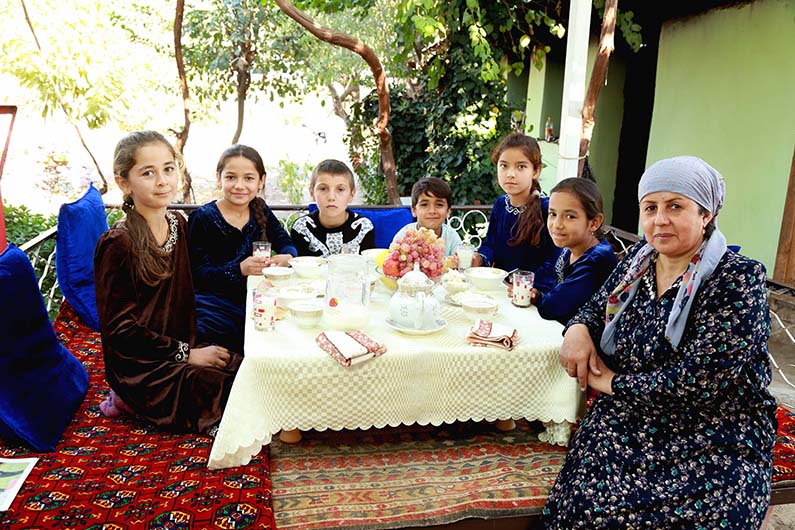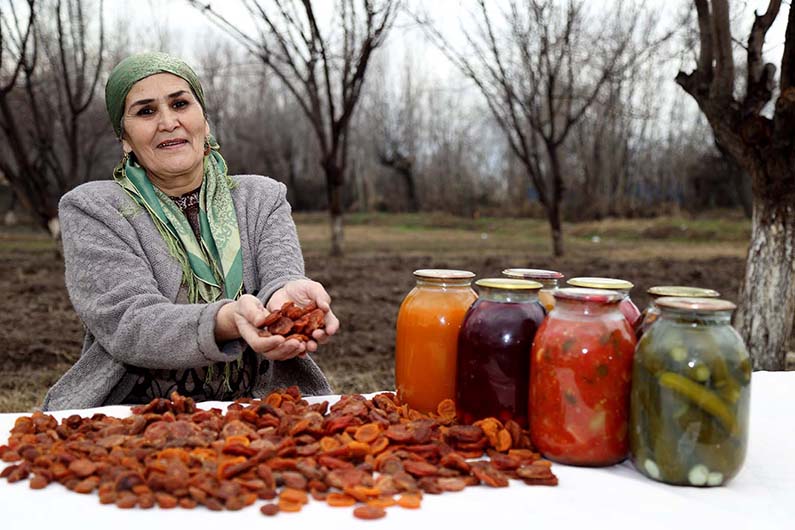Empowered to Thrive in Tajikistan

This post originally appeared on Chemonics' webpage.
Imagine you are the sole female provider for a family in Khatlon, Tajikistan, a province in which food insecurity is an everyday reality, and the agricultural sector dominates the market. Your livelihood might rely on your ability to sell your apricots, to feed your children uncontaminated milk from one of your cows, or to churn that milk into butter, cream, or cheese. You’d want to know how to best leverage your household’s resources. Once you meet your family’s basic needs, you might consider opportunities outside of the household, such as accessing local fresh markets to sell surplus produce or goods. Ideally, you could turn to your neighbors or others in your community who understand your needs and challenges and have lived your experience.
The above scenario is familiar to Hurinisso Davlatova, a homestead farmer from Khatlon and a single mother. Single parenting is not easy, and ensuring that her children had enough nutritious food was sometimes a challenge. However, the Feed the Future Tajikistan Agriculture and Water Activity (TAWA) is addressing these challenges to food security and financial stability so that smallholder farmers — especially women like Hurinisso — can continue to meet these basic needs while accessing the networks and knowledge they need to feel confident in their abilities to do so.

Hurinisso Davlatova sits with her children.
Collaborating, Learning, and Adapting from Farm to Fork
One key to TAWA’s success is the collaborating, learning, and adapting (CLA) framework used in its Farm to Fork capacity building program. The program invites women — particularly those who may soon have children or those with children under the age of 2 — to build their capacity, skills, and knowledge to improve postharvest handling, production, processing, consumption, and sales of nutritious foods. Practically speaking, CLA embeds continual improvement and learning into every activity that the project promotes. This includes intentional learning feedback loops, opportunities for sharing knowledge, and the use of technology to support learning and behavior change.

To promote CLA from the outset, TAWA recruited and trained 12 household extension agents (HEAs). HEAs — all women from Khatlon — were selected, in part, for their commitment to open dialogue and continual learning. Over the course of implementation, TAWA staff developed an eight-step learning cycle, pictured below. Alongside TAWA specialists, local leaders, and smallholder farmers, HEAs participate in town halls and conduct surveys to identify high-priority training objectives. As a result, TAWA prioritizes what the Khatloni women really need, rather than focusing on preconceived notions of success. Once the community has set priorities, TAWA specialists train HEAs in the new skills and knowledge so that they can in turn train cohorts of female farmers on skills such as apricot drying and the hygienic care of dairy cows. Perhaps most importantly, HEAs simultaneously constitute and help build a support network of knowledgeable women — including program graduates — who incorporate feedback, check-ins, and technologies in their efforts to empower other women in their province.
Malika Almatova, a mother of six from northern Tajikistan, reflected on skills that she and her family learned from their neighbor Azizmo Mahmadieva. Azizmo had attended TAWA-supported training sessions on modern apricot harvesting and drying techniques in 2016.
“I’m very grateful to Azizmo for her initiative to mobilize women in my village to learn new skills […] My daughters-in-law learned the proper apricot drying technique, which will help them earn money for their families and themselves,” Malika explained.
Due to the value added by the improved postharvest handling techniques, Malika and her daughters-in-law were able to sell 150 kilograms of dried apricots at their local market to generate $400 in revenue during the summer of 2018.

Malika Almatova displays her dried apricots after being trained on modern harvesting and drying techniques.
Pausing to Reflect
After supporting training for the first two cohorts of women, TAWA facilitated a post-activity review in 2017 to reflect on successes, challenges, and priorities. Initial data suggested that participant rates were dropping after three months, so the team adapted its approach to stay on track to reaching 50,000 farmers in the Khatlon province. Specifically, TAWA required that all instructors be women to better tailor the training sessions specifically for women. TAWA also reduced its cohort sizes from 25 to 20 women and the length of program from five to three months based on feedback, which suggested that smaller training sessions across a three-month period were most effective. To maximize the impact of its training materials, TAWA reformatted many of them, including switching from lengthy brochures to illustrated flipbooks. As households began to use digital phone technologies more frequently, the team introduced tablets for HEAs to use in their training. With these changes, the program noted a higher retention of participants.
Fruitful Impact: Habits are Sticking
Six cohorts of women have participated in the Farm to Fork learning cycle, with 30,000 participants over 2.5 years. Though results are still preliminary, TAWA sees sustainable signs of improvement in nutrition, sanitation, and farm production. After three years of implementation, members of the first TAWA cohort participated in a survey to determine whether they had continued to apply improved practices for hygienic dairy cow handling, vegetable and fruit canning and drying, compost production, and household budgeting. The sample shows promising results, particularly for improved practices for hygienic dairy cow handling — which had a 91 percent adoption rate — and improved vegetable and fruit canning — which had an 88 percent adoption rate. The results are not entirely conclusive due to the small sample size, but more statistical analysis is underway this year to verify these findings.
TAWA staff, local stakeholders, and smallholder farmers are working together to promote CLA, making sure their impact sticks. As a result, women like Malika and Hurinisso can continue to increase yields, provide nutritious foods for their households, and even sell new products on the local market. Malika explained that she is grateful for the initiative: “For rural farmers like me and my neighbors, it is important to learn skills that provide opportunities to improve our livelihoods.” In other words, these women are not only able to meet their basic needs — keeping their families healthy and supported — they are thriving with the knowledge and skills they have learned, which they can use confidently for years to come.